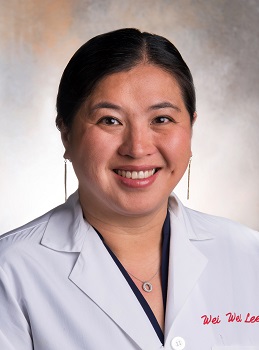Post-COVID-19 clinic director offers tips on lingering symptoms
The first step to treating patients with postacute sequelae of SARS-CoV-2 (PASC) is simple, one expert said: Believe them.
It can be overwhelming to wrap your mind around postacute sequelae of SARS-CoV-2 (PASC), ACP Member W. Michael Brode, MD, acknowledged during a session at the Society of Hospital Medicine's Converge 2022.
One systematic review found more than 50 symptoms that could be part of PASC, another recent study identified 100 symptoms, and some research has suggested even more. “Not to be outdone, [another review] identified 203 symptoms and 10 [affected] organ systems,” said Dr. Brode. “If you're trying to sleep tonight, try to come up with 203 symptoms.”

Perhaps that strategy could treat the insomnia associated with PASC, but at the meeting in Nashville, Tenn., April 7 to 10, Dr. Brode, a hospitalist and medical director of the post-COVID-19 program at University of Texas at Austin Dell Medical School, also offered some more clinical advice on treating the spectrum of symptoms found after COVID-19.
He cautioned that the current evaluation and management strategies are extrapolated from other disease states and based on anecdotal reports, because there is so little evidence on PASC that “it's almost like COVID-19 in April 2020.”
Names and numbers
Among other uncertainties, medical authorities have not even come to agreement on a name. Dr. Brode generally uses PASC, a term chosen by the NIH. “The CDC wants us to call it post-COVID conditions. Most British literature and the press will call it long COVID. Patients will call themselves longhaulers,” he said.
There's also no consensus definition, but most patients fit into one of three categories, according to Dr. Brode. “The first has end-organ damage, usually following acute, severe disease that requires hospitalization. That's pulmonary fibrosis, chronic kidney disease, diastolic heart failure, post-ICU syndrome.”
For an estimated prevalence of this problem, he cited a Chinese study that, at six months, found reduced pulmonary diffusion capacity in 29% to 59% of patients hospitalized with COVID-19, with a linear relationship between initial severity of illness and ongoing lung impairment. That study was published by The Lancet in January 2021.
The second group of PASC patients may include those who were less severely ill but have lingering postviral symptoms, including cough, shortness of breath, and fatigue, Dr. Brode said. Some symptoms more specific to COVID-19 have included headaches, nausea, and anosmia. A systematic review, published by JAMA Network Open in October 2021, found persistent symptoms in about 55% of COVID-19 patients at six months.
The third category of PASC patients includes those who were mostly not seriously ill with COVID-19 and “gets a lot of press and worry,” Dr. Brode said. “What about the strange symptoms patients are having?”, which he broadly categorized as dysregulated immune response and dysfunction of the autonomic nervous system.
“That can be anything from tachycardia or POTS [postural orthostatic tachycardia syndrome], GI dysmotility, sensory neuropathy, new urticaria or rash, difficulty with temperature regulation, to tinnitus,” he said. “Fatigue, neurocognitive impairment, and postexertional malaise are almost universal.”
Patients with postexertional malaise find that an activity that didn't used to be tiring “just wears them out and makes them feel worse for days,” Dr. Brode explained. “For most people it starts during the acute illness process and doesn't relent.”
The size of this third group of patients is hard to assess, he noted. An analysis of Veterans Affairs data, published by Nature Communications in November 2021, found that 4% of patients with mild to moderate COVID-19 were having ongoing symptoms at six months.
Risks and tests
Some of the risk factors for PASC are obvious, Dr. Brode said, as they are the same as those for severity of COVID-19 infection—older age, higher body mass index, etc. “The more severe at the beginning, the longer it takes to recover. That makes sense.”
But there also appears to be a connection between PASC and risk for autoimmune problems, as women and patients with pre-existing autoimmune disorders are more likely to have persistent effects after COVID-19. “You know, women predominantly get autoimmune disorders, which makes us think it might be on that spectrum,” he said.
One solved mystery of COVID-19 might offer some clues to some of the remaining ones. “Why do people lose their sense of smell?” asked Dr. Brode. “It's not actually because the olfactory neurons and the nerves are destroyed or damaged. It's the supporting sustentacular cells.”
The sustentacular cells are found not only in the nose, but also in the inner ear and the aortic and carotid bodies, so damage to them might explain tinnitus and problems with balance, heart rate, and dyspnea after COVID-19.
“It's a hypothesis for now, but potentially a mechanism why we're seeing some of this neurologic dysfunction,” he said, adding the good news that these cells regenerate, as evidenced by almost all COVID-19 patients eventually regaining their sense of smell.
With only hypotheses to work with, how do you treat PASC patients? The initial step is very simple, according to Dr. Brode.
“First of all, I believe them,” he said. “I've taken care of doctors, CEOs, high-powered people who just go, go, go and push, and they're telling me they're having weird neurologic effects with postexertional malaise, and you know what, they're not making this up.”
Because post-COVID-19 problems have been predominantly affecting women and people of color, there is a risk that patients' issues will be minimized by the medical community, Dr. Brode noted.
The second step is a basic medical workup. “Evaluate for alternative etiology” including common diseases like heart disease, cancer, and diabetes, he said. “But if it's new following the illness, it probably is postviral effects.”
Whether to thoroughly investigate the possibility of end-organ damage from COVID-19 depends on the patient's initial disease severity. Such complications are common in those who were very sick but relatively rarely identified in patients who weren't hospitalized, he said.
This gradation applies also to patients with ongoing dyspnea. “Risk of having pulmonary effects if they were outpatients is very low,” said Dr. Brode. “I would wait the full 12 weeks after hospitalization to see if there's enduring lung damage.” At that point, a chest X-ray is the first step for dyspnea evaluation, then a high-resolution CT if normal, followed by pulmonary function tests and finally testing of diffusion capacity.
Similarly, cardiac dysfunction is common in patients who were hospitalized, rare in outpatients. Cardiac symptoms, however, are common. “For a lot of people what's happening is we're seeing inappropriate sinus tachycardia, postural orthostatic tachycardia syndrome,” he said. “In clinic we're getting orthostatic vital signs on everyone. POTS is diagnosed by [going] from supine to standing: a heart rate [increase] sustained over 30 beats per minute for more than three minutes.”
Brain fog is a common symptom, for which Dr. Brode uses the Montreal Cognitive Assessment, although he said it is an imperfect tool for the job. “Major cognitive impairment is rare. It's usually in patients who had strokes while hospitalized or severe delirium,” he said. More commonly, PASC patients have trouble with recall and concentration.
Those symptoms could also be related to mental health effects of COVID-19. Evaluate patients' mental health, and don't be surprised to find problems, he advised. “I would almost argue that anxiety is part of this neuroinflammatory process. Depression is part of being alive over the last two years.”
Sleep disorders are common complications, too. “We are recommending that everyone get screened for comorbid mental health illnesses—identifying the patient's most pressing concern and their coping skills,” he said. “We should also be ruling out substance use.”
Treating the problems
Unless specific conditions or problems are identified by the workup, the treatment of PASC is largely symptomatic, he said.
“Everyone should get some sort of graduated exercise plan in a setting that is building back their stamina up and not producing postexertional malaise,” said Dr. Brode. “Most patients slowly are getting better over time.”
The key to the exercise program is a very gradual pace. “Postexertional malaise is a wall, and you don't want patients trying to hit their head against the wall, because pushing through—I've not met a single patient where that's an effective strategy yet,” he said. “A lot of the counseling is around energy management.”
Clinicians should explain that mental energy counts in the activity quota. “The brain is the most metabolically active organ in the body,” said Dr. Brode. “I think patients don't really realize that, especially if they're not doing a lot of physical activity.”
Physical therapy can be useful, but only if it's paced appropriately. “Physical therapy should be long COVID-specific,” he said. “In our traditional [therapy] model, they're getting three hours of therapy a day, and then they have to sleep for four days, because it's so exhausting, and that's actually bad for postexertional malaise … really doing them harm.”
Anecdotal reports from patients suggest that low-impact exercise is better tolerated than activities like running, which might be explained by damage to the microcirculatory system from COVID-19, he added.
Exercise can also help treat brain fog, although some patients may benefit from more specialized therapies. “Neuropsychology and speech language pathology can be really helpful,” Dr. Brode said. “It's almost doing occupational therapy for the brain of how to accommodate and really, once again, manage the energy.”
Brain exercises can be as simple as talking to a friend, he noted. “Social interaction, which has been really difficult during the pandemic, is the most cognitively demanding thing humans do.” Games like Sudoku and crossword puzzles can also build back brain strength. “Any sort of cognitive activity … if you enjoy doing it will help regain some of those skills, as the disease improves slowly over time,” he said.
If these tactics aren't working, there are a few pharmaceutical options. “For patients who aren't getting better slowly over time or can't do physical therapy, we are using antidepressants. There is some literature in chronic fatigue syndrome [on these drugs] potentially decreasing neuroinflammation and providing more activating energy,” he said.
If patients are still too tired to function, a stimulant such as amantadine, modafinil, or dextroamphetamine may be appropriate, Dr. Brode suggested. “That's been used in other [central nervous system] diseases like stroke. Really try to use that sparingly, but I will admit some patients need it and find it effective when the fatigue is overwhelming, and especially when it prevents them from putting food on the table for their family.”
It can be important to understand the patient's social determinants of health in choosing a treatment, he noted. “People's inability to work, the financial strain, has a huge impact and is an impediment to their recovery.” Social workers are active participants in the care at his post-COVID clinic, he noted.
Finally, on the pharmaceutical front, corticosteroids for patients with persistent cough have shown little success, he noted.
His one other prescription for PASC may come as a surprise: the internet. “Patients are doing really well if they're connected to a PASC community, these online Facebook groups,” said Dr. Brode. “I'm always a little bit hesitant about them as a source of good information. But patients have found a lot of solace and validation in speaking with others and hearing what they're going through, and we can help be the arbiters to make sure they're not trying anything too crazy out there.”
While trying new things is basically the current standard of care for PASC, Dr. Brode hopes to see more definitive guidance soon. “We need more research and therapeutic trials because right now we're taking what we know for other illnesses and trying to apply it, and that's good enough for now, but it needs to be better,” he concluded.





